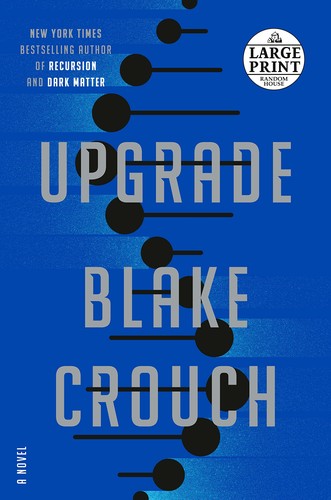Blake Crouch
First published 2022
My Rating: very good
ISBN 9780593157534
Review
Some thoughts before I’ve finished reading.
Our narrator has recieved a major “upgrade” to his intelligence and body through some sort of genetic hack. Now even if you could alter someone’s genome completely and the changes you targeted took hold, the changes shouldn’t manifest anything like as quickly as they did in the story. The author could hand-wave that away by talking about some special “growth phase” or something we have no idea about now, but he just ignored it. ] Some of the IQ test questions which are meant to demonstrate the new level of intellect the upgrade gifts him with aren’t all that impressive: I mean, he guesses 51 is the next number in the Fibonacci sequence after 34 and the examiner is all impressed.
When he’s trying to work out a hidden code he totally misses the obvious method. Now, that could be explained away – something more elaborate was needed for some reason – but it was never addressed.
This particular upgrade allows the recipient to detach from his emotions. Sentiment versus reason seems to be the big theme here. I don’t think it’s smartly presented. Without any sentiment, why do anything with your reason?
The human upgrade is compared with catostrophic agricultural engineering (in the story it was genetically enginerred, but real life problems have happened through introducing non-native species.) However, the whole premise there assumes the changes are heritable. A “gene drive” (a real thing) comes up early in the story but nothing indicates this is part of the “upgrade.”
It’s fair to say the story makes a case that the upgraded version of humans aren’t clearly what we want the human race to become: Will they be capable of making a good decision for shaping the future, or will their lack of sentiment lead them to discard everything that makes our world worth living in?
But, the case for re-engineering humans is compelling given the conditions in the story at that point. If humans as they are, as a group, simply won’t collectively make changes to prevent environmental collapse (as presented, it’s going to be terrible,) then humans have to change. It’s really that simple. Is the upgrade on offer the right change? This question isn’t teased apart from the narrator’s belief that any mass-alteration would be a terrible mistake. I tried to sympathize with the narrator but I really couldn’t. He hasn’t even thought it through. You know, investigate how this plan might actually unfold. He’s supposed to have a 200 IQ. Instead he has a wildly irrational reaction, even for a normal person.
There are a couple of problematic assumptions here. First, that if only we had a few more genius level people we could devise solutions to our world’s problems. Another part of the upgrade’s benefit will be that people will make decisions through reason rather than sentiment. If only we could do that, we’d behave in a way that increases our chances of long-term survival.
I think this is just wrong. You could equally plausibly argue that lack of sentiment – simple rational short-term optimization – is what’s lead us to the environmental disaster we’re heading into.
Long-term planning can be driven by sentiment (worry, anxiety) just as much as by rationality (careful projection and calculation.) The thing is, worry and anxiety can often exist based on bad or false predictions or distorted ideas about reality and the future. But if well-informed by careful reasoning from actual data, it may be only sentiment that moves us to act.
A rational person who cares nothing for long term outcomes as long as he’s fine for now is worse than useless since he may block changes that only benefit others in the distant future as his expense.
People frightened about making changes now for future survival are also obstacles. It’s these people the proposed upgrade would alter, to allow them to see the light. But are these sorts of people really the reason we don’t better address climate change? Or is it just our inate short-term bias. Made it through another day, things are mostly fine. That’s more a matter of comfort versus discomfort. I think that view is bourne out by actual events. Real progress seems to get made when disaster strikes and not before. And, we switch to greener energy when it gets cheap and not before.
The notion that engineering humans is dangerous makes a lot of sense, especially when you imagine changes getting propogated through a gene-drive. First changes that seem beneficial may have down-sides (many real world examples of this.) Second, if only a few have access to actually desirable enhancements, you create more inequality which probably leads to greater instability and a crappy world for our descendants. See Beggars in Spain by Nancy Kress for a brilliant exploration of this notion.
Well, I’m still reading. I haven’t made up my mind.
